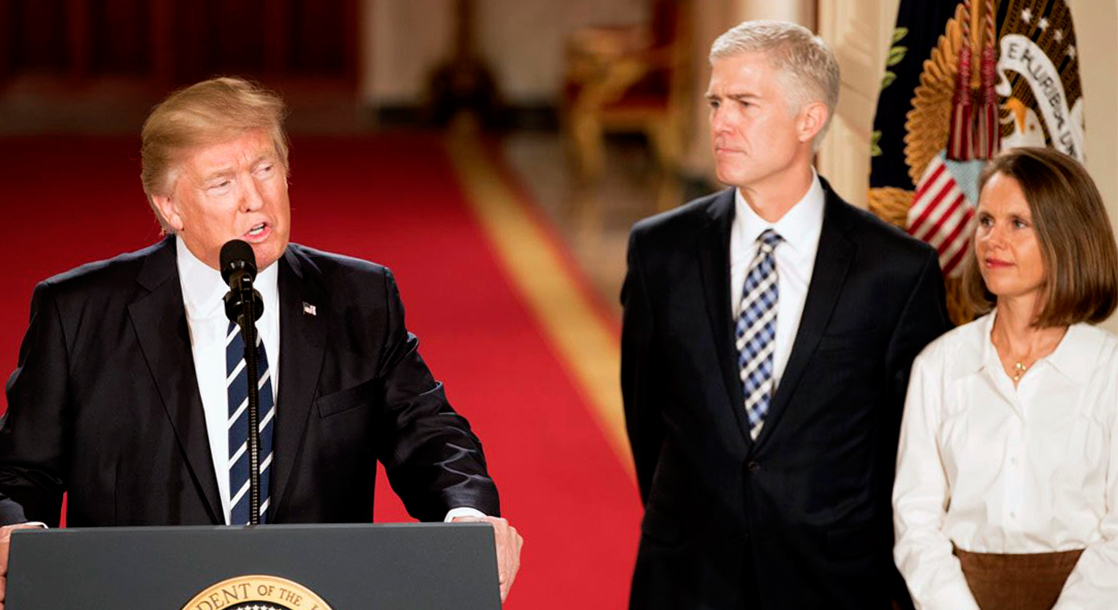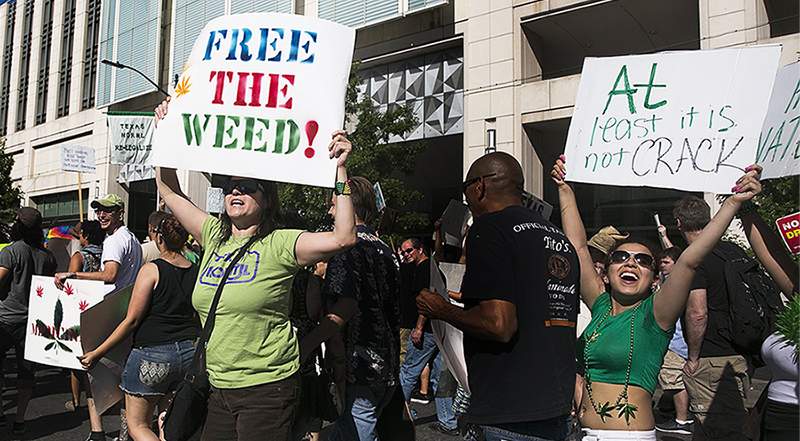All photos via Wikimedia Commons
Throughout eight years of bitter partisanship from Republicans, including nearly a year-long refusal to confirm Obama’s Supreme Court nominee Merrick Garland, the GOP made it clear they weren’t willing to give an inch to Democrats. Now, the tables have turned, as President Trump has nominated Neil Gorsuch, but the GOP is still shy of the 60 votes needed to confirm the appointment.
And while many hoped the Democratic minority could delay the process through a filibuster, reports indicate that the Republicans Congress will “go nuclear” if necessary and eliminate the option by proposing a majority vote, effectively guaranteeing Gorsuch’s nomination. Republicans view Gorsuch as a conservative in the mold of the late Antonin Scalia; the New York Times lists only Clarence Thomas as a more conservative justice. Gorsuch has been reliably conservative on issues as varied as labor, abortion, and LGBTQ rights. His staunchly right wing ideology makes him even less appealing to a Democrats still sore that Garland wasn’t confirmed.
So far, four Democratic Senators have broken ranks and come out in support of Gorsuch: Joe Donnelly (D-IN), Joe Manchin III (D-WV), Michael Bennet (D-CO), and Heidi Heitkamp (D-ND). Besides Bennet, these Senators hail from states that voted Trump, and they’re up for reelection in 2018. There are seven other Democratic Senators who represent states that went for Trump, and they are firmly aligned against Gorsuch. The four rogue Senators have their reasons for coming out in favor of Gorsuch. For some of them, it's their constituents, for others it's potential attack ads in their home states or the promises that got them elected. A closer look at these reasons proves that all politics really is local.
Joe Manchin III (D-WV)
West Virginia Senator Joe Manchin has risen to prominence as something unthinkable: a Democrat who will work with Trump. Though this might seem like an odd position, it makes sense for Manchin, a man who embodies the contradictions in his state’s politics. Once a solidly Democratic state, West Virginia went heavily for Trump, and has favored Republicans nationally since Bill Clinton left office. Workers who felt squeezed out by NAFTA and handicapped by environmental regulations have left behind by Democratic policies. Bernie Sanders spoke directly to this in the primary and won the state by a large margin, taking every single county in the state.
Given all of this, it’s not surprising that Manchin was the first Democrat to announce his support of Gorsuch. Manchin has become a master of criticizing both sides back home. When asked at a town hall about Gorsuch’s anti-labor policies, he criticized Merrick Garland’s rulings in favor of federal agencies, claiming to have said to the former nominee, “Judge Garland, how come the agencies always win with you? How come the average person never does, not once?” Manchin is viewed as the most vulnerable Senator up for election in 2018, and he has already started painting himself as a maverick in hopes of keeping his seat in a very Trump-friendly state.
Michael Bennet (D-CO)
Bennet is the only one of the four Senators supporting Gorsuch from a state that voted for Clinton, and he doesn’t stand for reelection in 2018. But, Bennett has a reputation in the Senate for cautious pragmatism, and it seems that he’s playing his traditional role once again. Despite being a blue-ish state, there are a number of Republicans in statewide office, and a strong Republican constituency in Colorado, and Republicans think they could turn his seat red. Bennet is being targeted with attack ads, including one courtesy of the Judicial Crisis Network. Furthermore, Neil Gorsuch himself is a Colorado native, which has put further pressure on Bennet. Gorsuch also has connections to a Colorado billionaire named Phil Anschutz, who some speculate might throw money against Bennet if Gorsuch isn’t confirmed.
Joe Donnelly (D-IN) and Heidi Heitkamp (D-ND)
The other two Senators who support Gorsuch have far less complicated motivations: they fear Republicans will use their vote against them. Since their seats are up for reelection in 2018 and they live in reddish states, these two Senators are on the lookout for ways not to rock the boat. Donnelly issued a bloodless statement on Gorsuch, calling him a “qualified jurist,” after $1.3 million in opposition ads were thrown at him. Heitkamp, who already has a reputation as a centrist said, “This vote does not diminish how disturbed I am by what the Republicans did to Judge [Merrick] Garland. But I was taught that two wrongs don’t make a right.”
Since the Senate whip count stands safely above the 40 votes needed to filibuster, breaking ranks isn’t a complete betrayal for these vulnerable senators . It’s a virtual certainty that Senate Republicans will bring an end to filibuster by rewriting the rules to require only a simple majority of 51 votes to confirm Gorsuch. This is the kind of iron-fisted move Democrats want the Republicans to make, since they can’t stop Gorsuch from taking his seat. If they can’t beat Gorsuch’s nomination, they might as well score what political points they can by making Republicans look like ruthless partisans, and showing their base they are willing to fight. It seems like these two have gotten a pass from the rest of the party to keep their politics local this time around.











